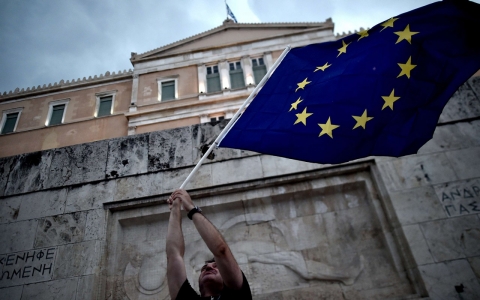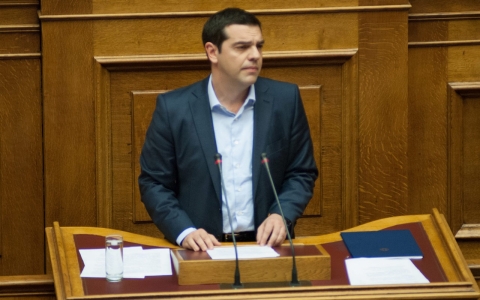ATHENS — After a heated day of last-minute bailout pleas and rejections, the prospect of Greece missing its $1.7 billion loan payment to the International Monetary Fund — the subject of months of speculation and hand wringing — became a reality overnight.
As Greek and other European leaders continue frenzied discussions today, Greeks — long inured to uncertainty after five years of economic crisis — are wondering what comes next. In the run-up to Sunday’s referendum, Greeks are divided over whether to accept international creditors’ terms for a new bailout, and mistrust runs deep on both sides.
Last night’s “Yes” campaign rally at Syntagma Square drew about 10,000 demonstrators, despite a threatening summer storm, in favor of keeping the euro. As the clock ticked toward the 1 a.m. International Monetary Fund (IMF) payment deadline, heavy rain forced the overflow crowd from the square and left many huddled in nearby bars or under the alcoves of overdrawn ATMs and shuttered banks.
Attendees said they were there to voice not just their opinion on the forthcoming referendum but also their concern for the possibility of a Greece unmoored from the rest of Europe.
“It’s important to have rules, and in the EU there are rules,” said Margarita Grammatikou, a 21-year-old student. “If we are not in the EU, it’s kind of like anarchy.”
Like others at the rally, she said missing the IMF payment deadline, which was widely assumed would happen, is part of ruling party Syriza’s agenda to move Greece away from the EU. “If the IMF does not give us some more time, it’s like the government is getting what it wants — to leave the eurozone,” she said.
Panayiotis Kotsalis, another “Yes” demonstrator, blamed the current government for Greece’s joining the club of nations that have missed IMF payments, which includes Sudan, Zimbabwe and Cuba. “This [missing the payment] has happened, so what can I do? I didn’t vote for this government,” said Kotsalis, a 47-year-old geologist. “I’m not going to kill myself … If the ‘yes’ campaign goes well, the message will be delivered — ‘Let’s save Greece.’”
Others spoke in stronger terms. “It’s a disgrace for the Greek state and the Greek people to be the first county in the so-called Western world to have such a big debt in the IMF, of which Greece is a founding member,” George Ravos, 34, said at the rally. “Depending on the outcome of the referendum, we will have some time to make it up, but it’s already too late. You cannot play with these things.”
A few miles from Syntagma Square, in the down-at-heel neighborhood of Omonia, Vasilius Papadimitriou, a 52-year-old taxi driver and a member of the Communist Party, remained defiant about last night’s milestone. “It’s not a deadline for us,” he said. “It’s a deadline for [the IMF] because it will lose billions.”
Still, Greeks on both sides of the bailout debate are quick to point out the country’s responsibility in its financial downfall.
“Greeks are more angry than they should be,” said Kotsalis. “The same people who are now screaming are the same people who took money from Europe.”
Vasily Frantzis, a 44-year-old lawyer who intends to vote a “big fat ‘No’” in Sunday’s referendum, said blame for last night’s unprecedented missed payment should be shared with austerity proponents.
“We have to make reforms in the public sector, of course, but not under choking circumstances, because that just doesn’t work,” he said, standing on the unusually quiet promenade of Aiolou. “It’s not this government’s fault that it has come to this. It’s the general austerity policies of the European community that have come to a dead end.”
Greece’s debt load stands at about 300 billion euros ($330 billion), or 180 percent of GDP. With the late payment, the country is considered in arrears and, pending another agreement, may not borrow additional funds from the organization. Meanwhile, the European Central Bank still has a funding arrangement with Greece, with a 3.5 billion euro payment due in less than three weeks causing additional concern.
Frantzis expressed lingering anger at a 2013 admission by the IMF that it underestimated the damage that austerity would cause to Greece’s economy and that 90 percent of bailout funds went to servicing previous loans instead of to Greek coffers.
“We have the IMF saying that it made mistakes in calculating the effects of austerity to people losing jobs and committing suicide … This is not about helping or sustaining a country. It’s about getting money to the banks,” he said, “which for me is inconceivable, unethical and the worst kind of war. This is wartime. It’s just financial war.”
With banks closed and a daily withdrawal cap of 60 euros in place since Monday, Greeks are already feeling the consequences of missing the payment. As bailout proposals and referendum plans change hourly here, most are unsure what happens next, but few remain optimistic.
“There are consequences for everyone,” said Ravos, a “yes” campaigner. “Especially the unlucky ones who do not have a job and do not have access to basic needs.”

Long lines at banks as fears mount; EU says Greek proposal doesn't address labor and tax reforms

Creditors appear less afraid of Greece’s adverse influence on other EU states than they were in 2011

The Greek bailout referendum puts voters and their government between a rock and a hard place






Error
Sorry, your comment was not saved due to a technical problem. Please try again later or using a different browser.